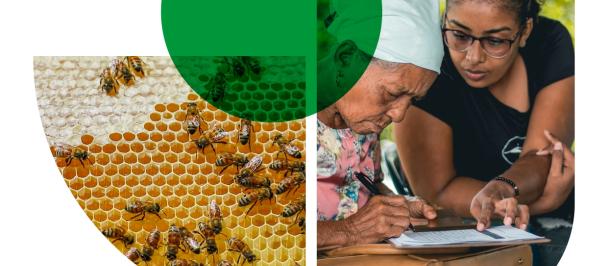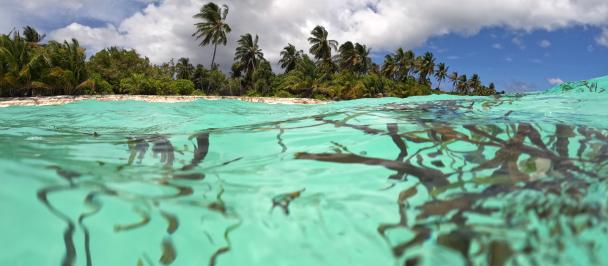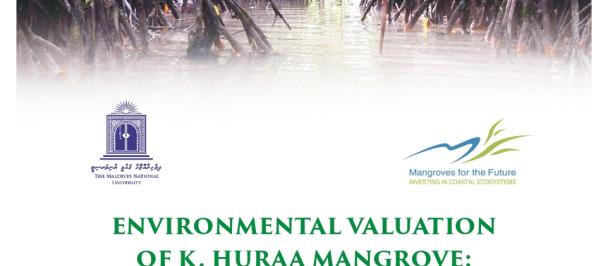International Biodiversity Day 2023
An Ode to Life
May 22, 2023
Millenia ago, your ancestors sailed to my islands in search of a new home.
My islands are sanctuaries scattered like pearls across the vast ocean.
In my islands, your ancestors found shade from the glistening sun.
My humble forest provided sustenance, medicine, and a land to call home.
In the turquoise lagoons, your ancestors found me, coral.
I am a garden, an underwater forest, an oasis of life and color
My kingdom is vast. I am the home of billions of lives; big, small and everything in between.
Our lives intertwined. You became people of coral.
I housed you, and in return, you respected our balance and took only what you needed.
Your tales spoke of the ebb and flow of our shared home, the ocean, and together, we flourished
But the tides are shifting.
The sun shines brighter, the water is warmer.
I am not ready for this change, none of us are.
My gardens are less hospitable. The billions of lives I house are leaving.
The life you depend on, the life that sustains you.
I am losing my color, my vibrancy, and my spirit. I do not know how much longer I can hold on for.
I need your love, respect, and care. I need your connection.
Without love, how can we find our way?
When the tide is low, I visit your shores.
Take your children to meet me and find the gifts I leave for you.
Look at my gardens, my ineffable beauty, and remember that we are both of the ocean.
The crabs, mangroves, white terns, bats and sharks. You and I. We are all interconnected in this beautiful web of life.
Life is diverse, it comes in many shapes, colors, and sizes. Some swim and some fly.
Yet, we are one.
An Ode to Life
The First Settlers
Millennia ago, sailors from faraway lands waved goodbye and farewell as they set sail in search of a new home. The endless ocean dominated their view for months. Imagine their relief upon the sight of the viridescent islands resting atop the aquamarine waters.
It is unclear when the first settlers arrived in the Maldives. Latest archaeological evidence suggests that the Maldives was first inhabited in roughly 1500 BC by Aryan immigrants from neighboring South Asian kingdoms. Though we may not know why the first settlers arrived in the first place, they must have found a welcome respite in the shade of the lush humble forests in the Maldivian islands. These forests were full of bounty and beauty. For the trained medicine woman, it was a pharmacopeia of potions. Beys fathangu (Sappan wood), a remedy for skin diseases and menstrual functions. Viha Filaa (one-leaf clover), a treatment for cough and leprosy. Kalhukalhlha (Devil’s backbone), a remedy for asthma. The ever present coconut palm provided in abundance. Food, water, oil, medicine, timbre, fiber and fuel, all gifts of the palm. These miniscule islands, with its calm waters and bountiful woods, were oases in the vast ocean.
A dizzying blend of color and life must have greeted the settlers as they first dove underwater in search for sustenance. These would have been our first encounters with the coral kingdoms. Corals, the rightful monarch of this archipelago, are the foundation of all life in the Maldives. Though they occupy only 1% of the ocean, corals are home to a quarter of all life in the sea, rivaling old-growth rainforests in biodiversity. These orchestras of life are complex, beautiful, strange and everything in-between. The triggerfish valiantly guards their nest, clownfish seek shelter within their sea anemone partners, and Blacktip Reef sharks hunt gracefully in these underwater kingdoms. The kingdom is a delicate balance of life. Each animal, no matter how large or small, maintains this sacred balance.
Maldivian life became deeply intertwined with the coral kingdoms. Inspired by the beauty of the natural world, we adorned intricate patterns on corals as tribute and decoration. We built our homes, and even our mosques, with coral. We found sustenance in the rich Maldivian oceans and we grew a special affinity for skipjack and yellowfin tuna, animals that indirectly rely on the bait fish found in the reef.
Over the years, our ancestors found a home in the woods and seas of the Maldives. We became people of palm and coral. Children of the sea.
Shifting Tides and Warming Seas
Humans have long altered the natural environment. Though our capacity to do so was limited. Our alterations were not always destructive. We also discovered powerful reciprocal relationships, a form of equal give-and-take with the Earth. Cultures across the world valued these reciprocal relationships as sacred, and even our indigenous knowledge recognized the delicate balances of nature. Our tale and folklore depict both a reverence and respect of the natural world, especially the ocean. These stories of old recognized the life-giving and destructive nature of nature.
The industrial revolution, the transition from creating goods by hand to machines, started to dramatically transform the cultural, political, economic, and ecological landscape of the world. As greenhouse gas emissions blanket the Earth, these gases trap the sun’s heat, leading to a warming planet. Though the Earth experienced natural shifts in its climate throughout its long history, the current unprecedented rate of change and warming is occurring at a rate not seen over millennia.
In this shift, the ocean has dealt with the brunt of climate change. The ocean is the world’ most powerful carbon sink, absorbing over 90% of the heat generated by rising emissions. Though the ocean is powerful and resilient, it can only also take so much. Warming seas cause thermal stress on coral, leading to coral bleaching and eventual death. We have already lost over half of the coral ecosystems since the 1950’s. Coral bleaching is only a harbinger of what is yet to come. Spawning grounds for fish and other complex food webs will cease to exist and biodiversity will suffer. Through an economic approach, this could result in the collapse of food systems and other industries that rely heavily on the health of the ocean and its ecosystems. Though the Maldives is one of the smallest countries in the world, the archipelago is home to the 7th largest reef ecosystem. The Maldivian economy and way of life is built upon the richness of the Maldivian biodiversity.
The effects of coral degradation and biodiversity loss is well-studied and understood. The uncertainty, however, lies in how we, the guardians of this environment, will react in this crisis. We can only flourish together once again if we respect these ancient balances of nature and give back to the life that has sustained us for so long.
An Interconnected Web
People all over the world are responding to the pleas of the natural world. Climate scientists, policy makers, conservationists, divers, artists, photographers, videographers, writers, storytellers, activists, lawyers, concerned citizens, and more are involved in a global effort to raise awareness, make meaningful changes, and turn the tides against climate change. The fight against climate change is a fight for an equitable world and regenerative world. It requires us to acknowledge the disproportionate nature of the climate crisis and the role of polluting industries.
Along with these efforts, it is important that we rekindle our sacred relationship with the natural world.
We must see the Earth “through the eyes of a child” as we once did when we were young. Remember the joys of time spent at the intertidal zone? Searching for lost treasures hidden deep in the crevices? Or the elation of a simple swim with your friends? Remember how beautifully the leaves glistened in the sunlight? Though it is difficult to maintain this connection in a world that feels concrete and devoid of life, rekindling that relationship is part of the fight. It is one of the most meaningful actions one can take amidst the climate crisis. In this relationship with the living breathing world, we find empowerment to fight for the Earth in whichever way we can. Be it through storytelling, activism, outreach, policy-making or even helping others connect closer to nature.
In this relationship, we are more likely to act in ways that are kinder and gentler to the Earth. We can begin to look beyond oneself and see these ecosystems as an interconnected web of life. How beautiful is it that billions of life forms momentarily share this Earth to sustain itself? We are deeply reliant on these lives. In this reliance we must learn to respect and care for them, as they have cared for us for millennia. It is up to us to choose. Do we want to live in a world that looks at nature as a product to extract and consume? Or shall we see the natural world as a shared home in which we are one life form in a vast and beautiful web of life.
UNDP Maldives in collaboration with:
Stories: Ijunad Junaid
Illustrations: Ijunad Junaid and Naza Shaukath

 Locations
Locations



